
The Free Press

If you build it, Latinos will come.
That’s what the Harris campaign seemed to think when they held a rally last Saturday in Bethlehem, Pennsylvania, a town in which nearly a third of the population is Latino. The event, aimed at Latino voters, featured vice presidential hopeful Tim Walz as well as two of Hollywood’s biggest Puerto Rican stars: Anthony Ramos of Hamilton fame and Liza Colón-Zayas, the Emmy-winning star of The Bear.
When Walz dashed onstage, wildly waving both hands, even he seemed taken aback by the fervor of the crowd. “Wow,” he said, as he realized he was receiving a standing ovation just for being there.
The last six weeks, he told the crowd, have been “pretty, pretty strange,” as the crowd erupted with laughter. “If it weren’t enough to be Vice President Kamala Harris’s running mate, I’m here with Anthony and Liza today.”
He paused, allowed the room to settle for a second, then delivered the punch line: “No old white guy could ask for more.”
Actually, he could. He could’ve asked for more Latinos. Of the estimated 1,500 people who showed up for the rally, one official told me there were probably fewer than fifty Latinos.
One of them, a retired truck driver named Luis Gonzales, said, “I thought there would be more Latinos than what I saw.” Another, 70-year-old Gloria Cuadrado, who was born in Puerto Rico, noted that Walz drew attention to the fact that the rally was held the day after the seventh anniversary of Hurricane Maria. “The focus was for the Latino folks,” she said. “But I didn’t think the turnout was there.”
There is no state that matters more in the upcoming presidential election than Pennsylvania. It has more Electoral College votes (19) than any other swing state. And in the last two elections, the Pennsylvania tally has been exceedingly tight: In 2016, former president Donald Trump won by just 70,000 votes out of 5.7 million cast; four years later, he lost by 80,000 votes, to Joe Biden. But between 2016 and 2020, the percentage of Latinos who voted for the Democratic candidate dropped from 75 percent to 69 percent.
In Northampton County, a county of over 300,000 people where Bethlehem is located, and where Latinos make up 13 percent of the population, Trump beat Hillary Clinton by four percentage points in 2016, while Biden won by one percent four years later—a total of 1,233 votes.
“We understand that it’s a tight race and that it’s going to be decided by a few thousand votes in a few states,” said Maca Casado, the director of Hispanic media for the Harris campaign. “The Latino vote is going to be critical,” she added.
For the Democrats, Casado added, that means performing well in the state’s so-called Latino Belt—the handful of counties west of Philadelphia with booming Latino populations. These include Luzerne, Berks, and Lehigh as well as Northampton County—the old manufacturing center of eastern Pennsylvania.
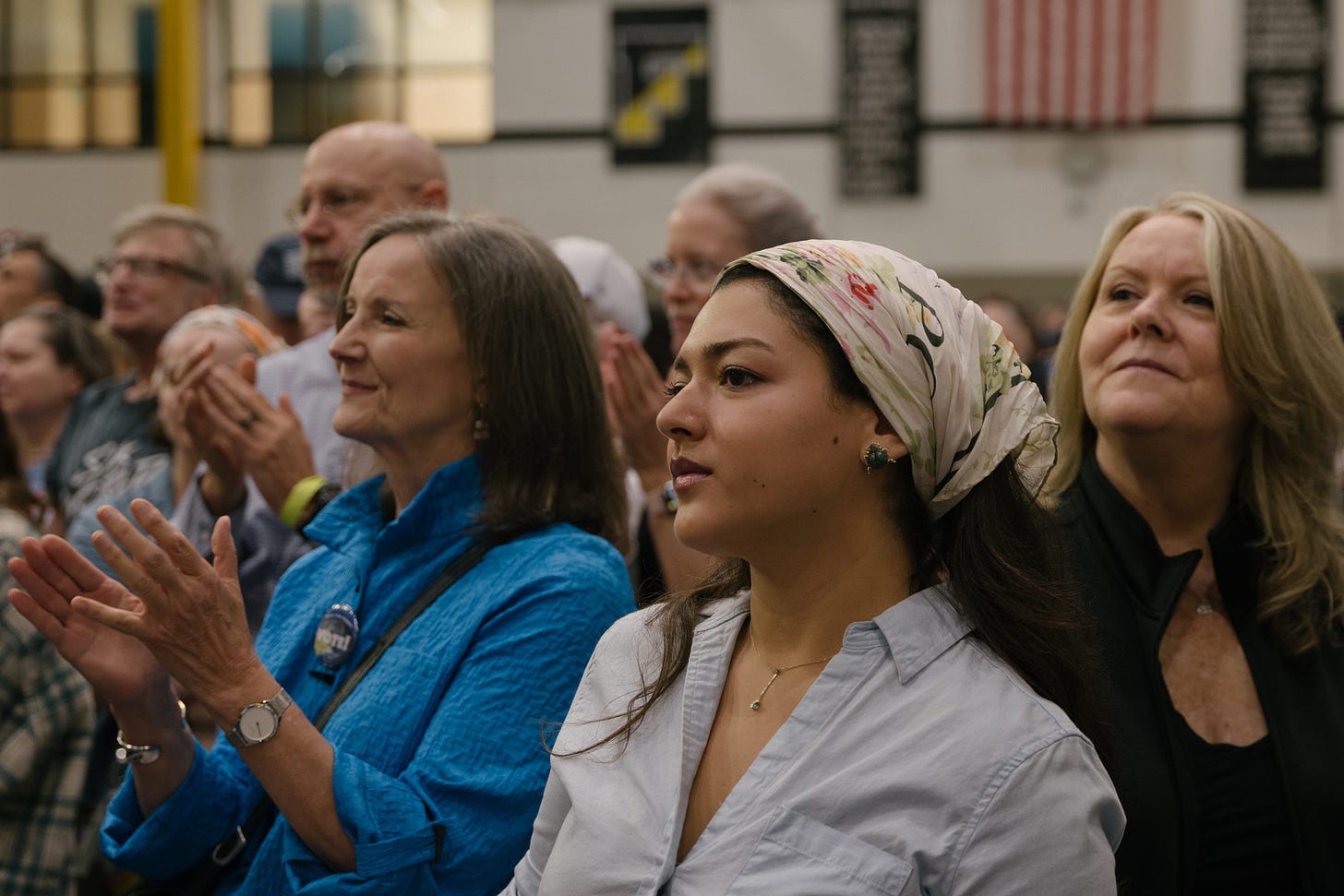
Northampton County is one of only 25 in the country to back Obama in 2012, Trump in 2016, and Biden in 2020. According to recent polling, the county is leaning toward Vice President Harris by 50 percent to Trump’s 45 percent. Latino voters in the county back Harris by 60 percent compared to Trump’s 25 percent. That sounds impressive, but it’s also a potential problem: If Trump makes gains in rural Pennsylvania—which he won overwhelmingly in 2020—while Harris’s support slips in areas where Biden did well, the former president will have the net advantage.
Casado described the Harris campaign’s effort to reach Latino voters as “unprecedented.” But not everyone agrees. “I really want Harris to win,” said Cynthia Mota, the first Latina city council president in nearby Allentown. “But I’m telling you, there needs to be more effort when it comes to the Latino community. My belief is that the Latino community is still undecided.”
Which has to make Democrats nervous given the inroads Republicans have made nationally in attracting Latinos. Ever since Trump became a presidential candidate in 2016, the percentage of the Latino vote for the Republican candidate has grown, from about 28 percent in 2016 to the low 30s in 2020. In the current race, some polls show Trump winning as much as 41 percent of the Latino vote nationwide, a coalition that includes the Cuban Americans of South Florida and Mexican Americans in the Rio Grande Valley.
“We know that we’ve had the Latino support in the past,” said the Harris campaign’s Casado. “But we don’t take anything for granted, and we understand that we have to work hard to earn every Latino vote.” She said the campaign was conducting “the first bilingual campaign in American history,” with Spanish-language versions of all the campaign literature and even some TV ads.
Mota, the Allentown city council president, said her party is “doing better this time around” than in previous election cycles, having figured out that in a time of high inflation, voters care more about feeding their family before any social issues. She has seen the polls showing Harris leading the Latino vote in Lehigh Valley, but, she cautioned, “We have to be careful with the polls because it gets people comfortable.”
Matthew Tuerk, the first Latino mayor of Allentown, said that while the Democratic Party has come a long way since 2020, when he was one of the only Biden canvassers in the area who could speak Spanish, it still has a ways to go.
“The party’s grown up a bit and they’re treating Latinos like Americans now, as opposed to a specific interest group,” said Tuerk, whose city has been majority-Latino since 2021. “They get that we are just Americans who also speak Spanish.”
He says he’s glad the campaign dropped Latinx—a term often used by progressive activists to describe his voting cohort, which Latinos actually dislike—and that the Dems no longer assume Latinos “just want to hear about the border.” He points out that many members of his Lehigh Valley community are Puerto Ricans who are in favor of a “compassionate” pathway to citizenship—but not an open border.
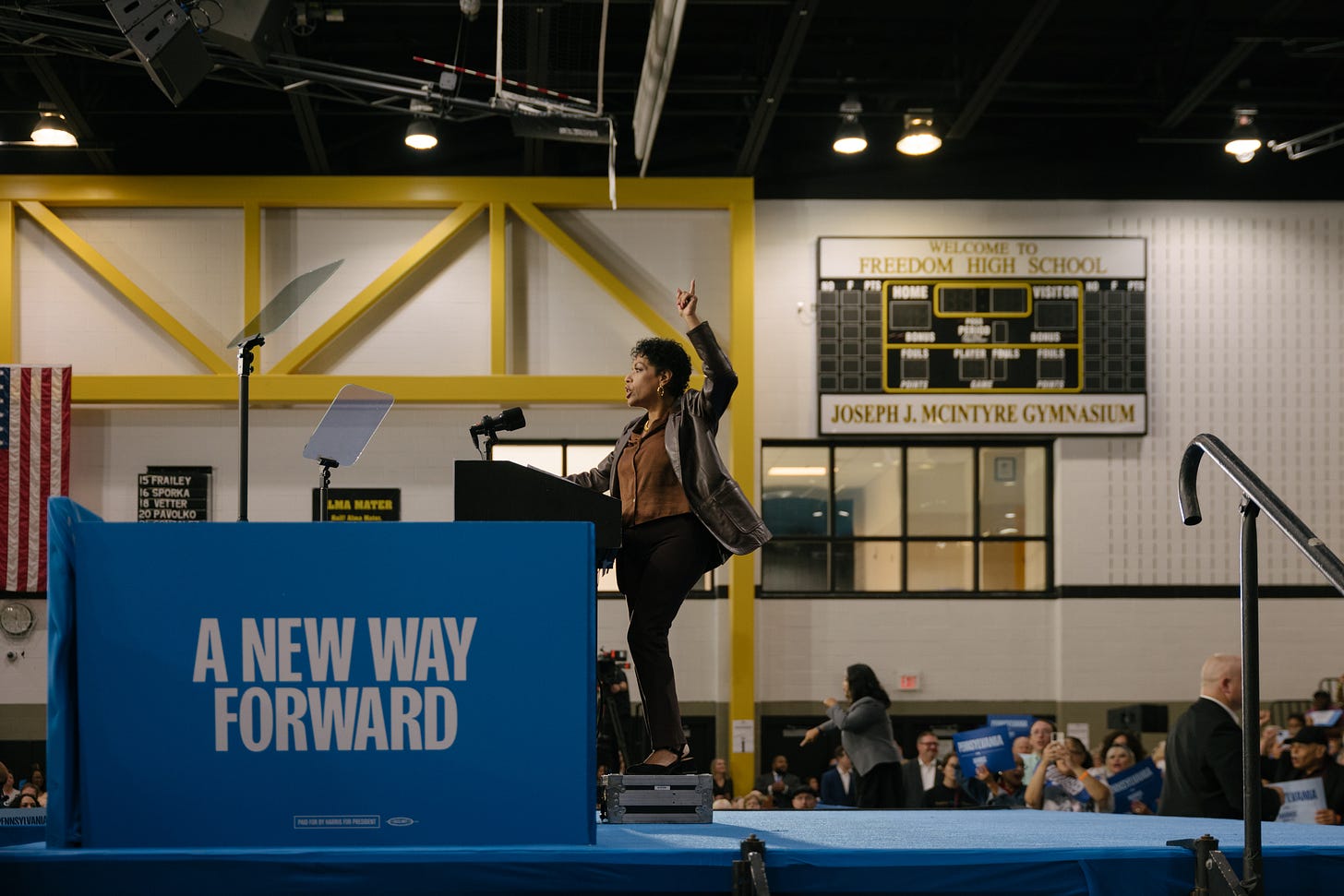
“A mistake that campaigns of the past have made is that they thought that if we’re going to talk to Latino voters, we have to talk exclusively about the border,” said Tuerk. “And I think they’ve realized that we are primarily interested in economic opportunity, educational opportunity, and we’re interested in public safety—these are all things that are resonant for Latinos and for everybody else, too.”
He also told me that the campaign needs to do more retail politics. Knocking on doors, he said, is how candidates “get votes in this city. We’re not there yet with engaging with the Latino voters. I’ve said this to the campaign.”
There are signs the Harris campaign understands what it needs to do. For one, during his remarks in Bethlehem, Walz stuck mostly to pocketbook issues.
“Our economy works best when it’s fair,” he proclaimed to a gym full of supporters. “We have a saying in Minnesota—we all do better when we all do better.”
A few minutes later, while waxing poetic about the power of unions, the former schoolteacher-turned-governor proudly added: “I may be the poorest person who’s ever run on a national ticket.”
The crowd laughed. Someone sent a whistle roaring throughout the room.
For all the effort the Harris campaign is putting into attracting Latino voters, the key question remains: Is it having an effect?
The voters I spoke with made it clear that the economy is what they most care about. Julissa Irizarry, a 30-year-old Puerto Rican, told me she has never felt poorer—though it’s not something she likes to talk about. When I met her in Allentown during her shift at the International Cultural Festival, where she passed out flyers for a local jobs program, she told me she thinks about her finances constantly.
“This is my second job,” she said while shuffling a stack of pamphlets. “My fiancé works too, and still—we’re like, just getting by.”
Earlier in the day, she said, she realized her family of five—that’s her, her fiancé, and their three kids—were out of groceries, so she picked up some milk and eggs at a CVS around the corner.
“Seventeen dollars,” she said. “Can you believe that?”
Things didn’t feel this hard to her under Trump, she said, but at the same time, she can’t stand the way the former president talks about women. She was especially offended by his comment that E. Jean Carroll, a former advice columnist who successfully sued Trump for sexual assault, wasn’t his “type.”
“I’m scared of voting for the wrong person,” Irizarry almost whispered, adding that she feels pressure from friends and family to stick with the Democrats as she has in the past. “But honestly, I think I’m leaning more towards Trump.”
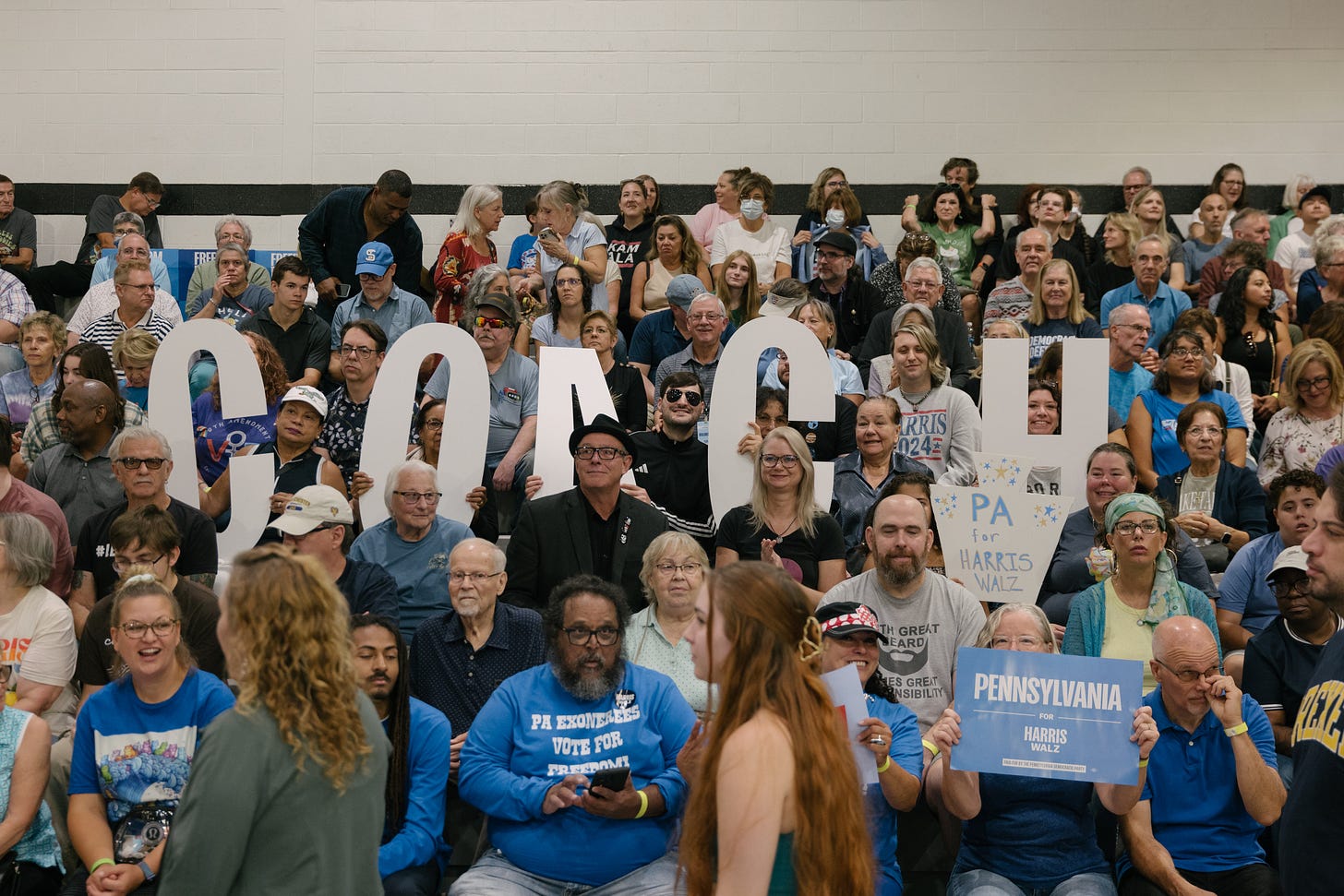
Across the field, I met Yahaira Davis, a 39-year-old nonprofit worker, handing out children’s socks to local families. A single mother of four, she told me she was also stressed about how to provide for her kids.
“I’m working my ass off,” she said. “I don’t have a college degree, so I have to have two jobs in order to support my family.”
She told me she’s undecided—“I need to do my research.” But she said everyone she knows is trying to decide for her.
“I feel pressure all around me in my church and from everybody to go for Kamala,” she said. “But I’m torn.”
“Everybody goes for the hype of, you know, she’s a woman and she’s claiming to be black. But I would rather this country be run by someone who knows what they’re doing and is responsible.”
I told her that sounds like a Trump vote, but she corrected me.
“I don’t know. I’m still undecided. I’m still undecided.”
Back at City Hall, I asked Cynthia Mota, the Allentown city council president, if she was worried about November.
“I worry all the time,” she said. “We don’t have this in the bag yet.”
Olivia Reingold is a writer for The Free Press. She spent four days in the Latino Belt to report this story. You can follow her on X @Olivia_Reingold and read her last dispatch from the field, “Party in the U-S-A.”
To support more of our work, become a Free Press subscriber today:

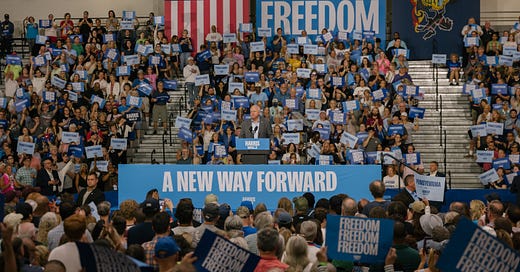






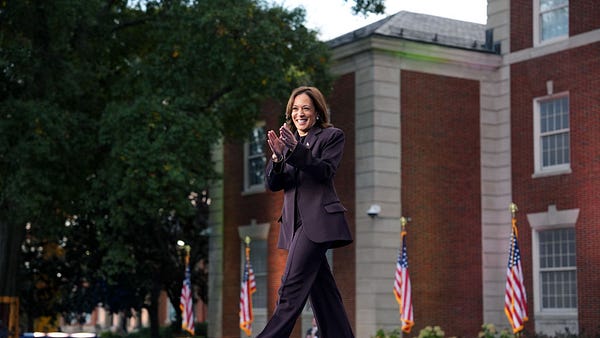





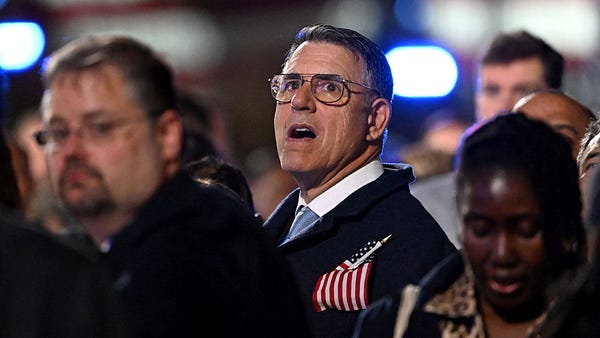

Hey, anyone want to bet that The FP editorial decision making by Oliver Wiseman will decide that today's bombshell news that the Biden-Harris Admin has WILLFULLY AND PURPOSEFULLY let in 425,000 criminals into our country illegally, including 15K murderers and 13K rapists?
How about, Oliver? You gonna decide this isn't news The FP should cover? I bet you will, you spineless Leftist propagandist.
"Earlier in the day, she said, she realized her family of five—that’s her, her fiancé, and their three kids—were out of groceries, so she picked up some milk and eggs at a CVS around the corner.
“Seventeen dollars,” she said. “Can you believe that?”
Things didn’t feel this hard to her under Trump, "
For the 1000000th time, Trump didn't have jack-all to do with the price of eggs and milk in 2019 anymore than Biden does in 2024. Would it be too much to explain to these folks that voting for Trump in 2024 is not pressing a "2019 Prices" reset button?? Or do we just go along with that and pretend that Trump "created" the economic conditions people remember (and often confuse with the COVID economy - the $2 gas prices for example), and not bother telling them either that Trump's proposed across the board 20-60% tariffs will raise prices on just about every product on the shelves by about that much?
Also, enough with the kvetching about grocery prices. If you buy your milk and eggs at CVS, for five people, you're paying a premium price for perishable goods at a drugstore, no shit they cost more. If you buy this stuff at a grocery store, a dozen eggs in my local King Soopers are between $3-$4 a carton. A gallon of milk is between $3-$4. What were the prices in 2019 - probably about the fucking same, give or take. Eggs did go up in price a couple years ago because of bird flu, not "Biden". They've fallen since. I'm sorry but I'm sick and tired of the increasingly out of whack inflation perspectives and this being an excuse to vote for Trump - who is running a campaign promising to raise prices on purpose, but apparently that's a bit too much for any reporter to even introduce into the conversation whenever it comes up - especially if they're coming form an outlet that for reasons I cannot fathom seems to be spoiling for a Trump win, evident in every slanted article highlighting on voters with negative attitudes about the Democrats and "quiet" Trump support, hardly being able to find, it seems, a single Harris voter in a 60% Democratic county from 2020. Or maybe just cherry picking which ones make the article to create a different impression HMMM.
"But I would rather this country be run by someone who knows what they’re doing and is responsible.”
I told her that sounds like a Trump vote, but she corrected me. "
Yeah, pretty much "someone who knows what they're doing and is responsible" does not sound like "Donald Trump" to me lol, nice fishing expedition though!